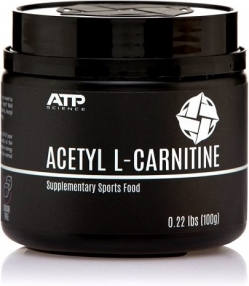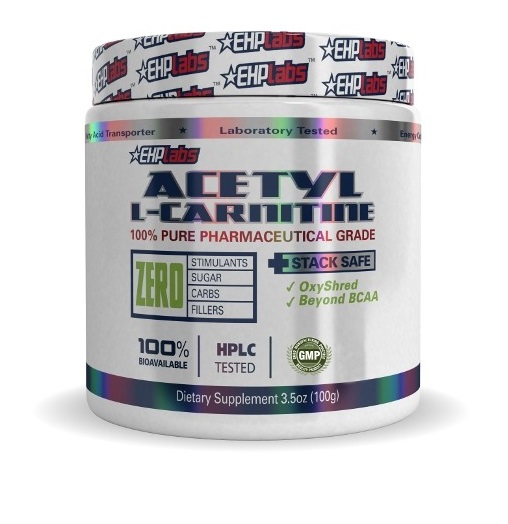L-Carnitine and Acetyl L-Carnitine, What's the Difference?

Both L-Carnitine and Acetyl L-Carnitine are two forms of the same dipeptide. A dipeptide simply means that it is made up of two amino acids, joined together. In this case, Carnitine is made from two essential amino acids called methionine and lysine. However, we also need enough iron and vitamin C in our system for this reaction to take place properly.
Carnitine is used to support the nervous and cardiovascular systems, brain and muscles. While L-Carnitine and Acetyl L-Carnitine are both great supportive nutrients, you may benefit from one form more than the other. For example, L-Carnitine might be used by those who exercise or participate in sports or who are aiming to lose weight. On the other hand, Acetyl L-Carnitine can energise the brain and support neuronal health.
If you're unsure which form of Carnitine is right for you, we have highlighted the differences below to help you find the supplement you need.
L-Carnitine
L-Carnitine helps the body convert fat into energy by transporting it to the mitochondria to be burned as fuel. This burning process is called beta-oxidation, where fat is converted to ATP or energy.
When taken regularly as a supplement, L-Carnitine supports weight loss, which is of course enhanced when combined with a quality diet and an appropriate exercise strategy. L-Carnitine is also taken as an enhancement for bodybuilding thanks to its excellent physical effects. Research has demonstrated that supplementation with this products leads to an extra 1.33kg of weight loss compared to placebo, as reported in Obesity Reviews in 2016.
Acetyl L-Carnitine Benefits
Acetyl L-Carnitine is essentially L-Carnitine plus an acetyl group added to the molecule. While offering similar effects as L-Carnitine, the Acetyl L-Carnitine benefits are quite a bit broader. It also has the added ability to pass through the barrier between your blood and your brain. This means it helps to energise the brain.
This is the preferred form of Carnitine for brain, nerve and memory support, as it assists with the synthesis of the primary neurotransmitter in the brain, acetylcholine. While it does also help convert fat into energy, Acetyl L-Carnitine benefits primarily mental clarity and focus, along with mood elevation. Acetylcholine has been linked to supporting learning ability as well, which is certainly a good thing when you’ve got some reading to do.

Supplementing
Meat, poultry, fish and dairy are the richest natural sources of Carnitine, while vegetables and grains contain relatively little of the amino acid. If you're vegetarian, vegan, or eat very little animal-products, you will find more benefits with L-Carnitine supplementation than most, as it ensures you have good levels of this dipeptide in your system. You may also be interested in Carnitine supplements if you are trying to lose weight, are a bodybuilder, or are looking to increase your mental focus for something in particular, like an exam.
If you are considering taking both L-Carnitine and Acetyl L-Carnitine as supplements together, this is fine and carries no risks. However, there may be some extra benefit in terms of absorption if you take them on an empty stomach. It is also recommended that you take Acetyl L-Carnitine consistently, that is, on a daily basis for a few weeks leading up to an exam or period of mental challenge, rather than 1 single dose beforehand.
It is not necessary to take both L-Carnitine and Acetyl L-Carnitine at the same time. Essentially Acetyl L-Carnitine offers the advantages of L-Carnitine, but with added benefits.
Whichever form of Carnitine you choose, you're going to appreciate the benefits. Both forms are great for your overall health and well-being, for fat oxidation, energy production, and general heart health. Our body manufactures it for a reason, right? Whether you choose to take L-Carnitine or Acetyl L-Carnitine will really depend on what effects you want to see. Go for L-Carnitine if you are looking for more physical benefits, and Acetyl L-Carnitine if you want an extra mental boost.
When it comes to dosage, shoot for 1.8 to 4 grams daily, in at least two divided doses. The lower end of the range may be fine for most people, I.e., 1.8-2.5g per day. Though for people with significant muscle bulk or natural height, the higher end of the range may be more appropriate, I.e., 2.6-4g per day.

- Reduced Fatigue Severity.
- Improved Sleep Quality.
- Reduced Prolongued Fatigue after Exercise.
- Reduced Mental Fatigue.
- Enhanced Concentration & Attention.

Carnitine for Low Moods?
If you aren't entirely sure what a Meta-Analysis is, it's a study of the studies, a research paper that has examined all of the quality published research to date. A Meta-Analysis offers a bigger picture look at how the intervention or supplement is working over multiple clinical trials, which tends to offer clearer and more precise insight. These research papers also tend to reduce the likelihood that any benefit seen is due to chance, which may occur in a study with a low number of subjects without a crossover design.
The paper earlier in this article from Obesity Reviews is a Meta-Analysis. Fortunately, a meta-analysis was published back in 2018 by Psychosomatic Medicine, indicating that Acetyl L-Carnitine significantly reduces depressive symptoms. This was determined as the authors of the article examined twelve clinical trials, which included 791 participants.

This is not surprising given that Acetyl L-Carnitine does indeed pass through the blood brain barrier, gaining access to the brain and its countless neurons. Carnitine offers antioxidant and neuroprotective effects, and can also donate acetyl groups for the generation of acetylcholine, an important neurotransmitter.
Exercise Performance
When it comes to Carnitine, it's not all about fat-burning, mood boosting and recovering natural energy levels. As if that wasn't enough! L-Carnitine offers benefits to exercise performance and body composition too, above and beyond simply dropping fat mass.
 There is a body of evidence that is accumulating to suggest that L-Carnitine may in fact enhance exercise performance, improve recovery and support muscle building in older adults. L-Carnitine supplementation has been shown to increase bench and leg press training volumes, as well as boosting average and peak power.
There is a body of evidence that is accumulating to suggest that L-Carnitine may in fact enhance exercise performance, improve recovery and support muscle building in older adults. L-Carnitine supplementation has been shown to increase bench and leg press training volumes, as well as boosting average and peak power.
On top of this, researchers noted increases in antioxidant status and reduced lactate levels after exercise with Carnitine supplementation. A study published in 2018 by Fielding R et al indicated that supplementation increased blood flow and oxygen supply to muscle tissue by improving endothelial function.
This study also showed that bodyweight decreased, while lean muscle mass increased. This indicates reductions in fat-mass. Though it may seem surprising that a supplement like Carnitine can boost muscle mass, this may be due in part to boosting mitochondrial health.
As we age, it becomes increasingly difficult to build lean muscle mass. In addition, mitochondrial health tends to decline with age, which are heavily relied upon to build muscle mass due to the high usage of ATP in protein synthesis. Therefore, supporting mitochondrial health may support the accrual of lean muscle mass in older age. In addition, improved mitochondrial activity should produce more physical energy and motivation to exercise, leading to more weight lifted and enhanced results as well.










